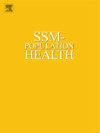Post-intervention gendered impacts and moderating factors of a government cash plus intervention for adolescents in Tanzania
IF 3.6
2区 医学
Q1 PUBLIC, ENVIRONMENTAL & OCCUPATIONAL HEALTH
引用次数: 0
Abstract
Introduction
Reducing poverty (including multidimensional poverty) and gender inequality can improve social development outcomes. Studies have sought to understand how poverty reduction and intersectoral programming targeted to adolescents can facilitate safe transitions to adulthood among adolescents. However, most intersectoral interventions for adolescents to date have been implemented by non-governmental actors with limited generalizability and potential for scale-up. In the current study, we examine 22-month post intervention impacts of the “plus components” of a cash plus intervention, Ujana Salama (Swahili for “Safe Youth”) targeted to adolescents ages 14–19 years (males and females) in households participating in a government social protection program in Tanzania. The government-implemented cash plus intervention, comprised of livelihoods and life skills training, a productive grant, mentoring, and linkages to adolescent-friendly health services, was implemented over 18 months in 2018 and 2019.
Methods
Using a cluster randomized controlled trial, we estimated post-intervention impacts in 2021 on the following domains: relationships, modern contraception, health seeking and HIV knowledge and risk, psychosocial outcomes and attitude, and violence. We further examined whether contextual factors, including gender norms and quality of health services, moderated these post-intervention impacts.
Results
Few impacts found at earlier rounds were still evident post-intervention. Exceptions include protective impacts on lifetime sexual violence risk among females and increases in sexual and reproductive health services utilization among males. Moreover, newly detected adverse impacts on mental health contrasted with earlier protective impacts.
Conclusion
While external factors such as lengthy delays of cash transfer payments to adolescents' households and the COVID-19 pandemic may have mitigated the potential for sustained impacts of this intervention, findings suggest that future programs may need to provide different combinations of programming, provide support longer-term, or intervene at more levels of the social ecological model to influence many of the outcomes examined and to effect more lasting change.
求助全文
约1分钟内获得全文
求助全文
来源期刊

Ssm-Population Health
PUBLIC, ENVIRONMENTAL & OCCUPATIONAL HEALTH-
CiteScore
6.50
自引率
2.10%
发文量
298
审稿时长
101 days
期刊介绍:
SSM - Population Health. The new online only, open access, peer reviewed journal in all areas relating Social Science research to population health. SSM - Population Health shares the same Editors-in Chief and general approach to manuscripts as its sister journal, Social Science & Medicine. The journal takes a broad approach to the field especially welcoming interdisciplinary papers from across the Social Sciences and allied areas. SSM - Population Health offers an alternative outlet for work which might not be considered, or is classed as ''out of scope'' elsewhere, and prioritizes fast peer review and publication to the benefit of authors and readers. The journal welcomes all types of paper from traditional primary research articles, replication studies, short communications, methodological studies, instrument validation, opinion pieces, literature reviews, etc. SSM - Population Health also offers the opportunity to publish special issues or sections to reflect current interest and research in topical or developing areas. The journal fully supports authors wanting to present their research in an innovative fashion though the use of multimedia formats.
 求助内容:
求助内容: 应助结果提醒方式:
应助结果提醒方式:


